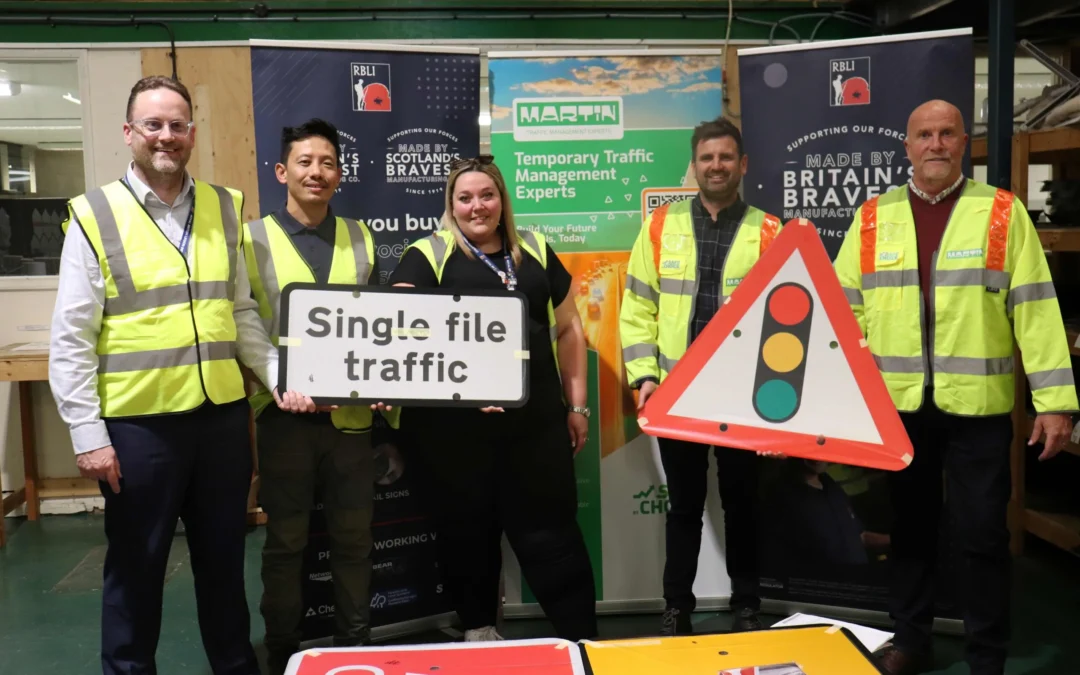While the UK came together to commemorate VE Day (Victory in Europe Day), a quieter but equally memorable moment had taken place in Aylesford, Kent. At the core of Royal British Legion Industries (RBLI)’ s social enterprise hub, a brand new traffic sign production line was officially launched built with purpose and people in mind.
The commissioning leaves a significant step in the long-standing partnership between RBLI and HW Martin (Traffic Management) Ltd, a company known for its national reach and commitment to responsible sourcing. The production line expands the work of Britain’s Bravest Manufacturing Company (BBMC), RBI’s social enterprise arm, which last year alone produced over 154,000 traffic signs.
Jobs with Meaning: Supporting Veterans Through Manufacturing
BBMC is more than a factory. It’s a social enterprise employing armed forces veterans, people with disabilities and those facing barriers to work. With veterans being twice as likely to be unemployed compared to their civilian peers, according to the Office for National Statistics initiatives like this are very much needed.
For these individuals, the Aylesford production line is more than employment. It’s a return to stability, routine and pride in purposeful work.
“To spend time with the team on a day like this was really meaningful,” said Andy Graham, Operations Director at HW Martin. “This partnership meets our business needs while creating employment for those who have served our country. That’s the kind of balance we value.”
Better Service, Better Impact!
The new traffic sign production line has been tailored to the specific needs of the traffic management sector… a move created by direct collaboration between RBLI and its clients, including HW Martin.
The result? Improved warehousing, faster bespoke sign creation and better turnaround for time sensitive orders. These enhancements allow BBMC to grow its operations and hire more veterans…a win…win model that combines efficiency with inclusion.
“This isn’t just about meeting demand,” explained Colin Harsant, RBLI’s Managing Director of Social Enterprise. “It’s about what happens when commercial decisions are made with social outcomes in mind.”
Social Enterprise on the Rise
RBLI’s model fits into a much bigger picture. The UK’s social enterprise sector contributes over £60 billion to the UK economy annually, according to Social Enterprise UK (SEUK). One in five of these organisations exists to provide job opportunities for those who face disadvantage, even through disability, mental health or life after service.
And this isn’t just good economics. It’s a growing effort in procurement and supply chains, with more organisations choosing partners that reflect their values.
What’s Next for RBBLI?
Looking to the future, RBLI is planning further investment in a new manufacturing facility, aiming to increase its reach and continue it’s mission of employment with dignity.
But for now, this latest development serves as a practical example of how business and social purpose can go hand in hand… producing real results for both clients and communities.
Our Thoughts
The next time you drive past a road sign, there’s a chance it was made by a veteran in Kent, someone who has served the country and now continues to contribute, just in a different kind of uniform.
It’s a reminder that when businesses work with social enterprises, they aren’t just buying a product they’re helping build futures for many in underserved communities.

